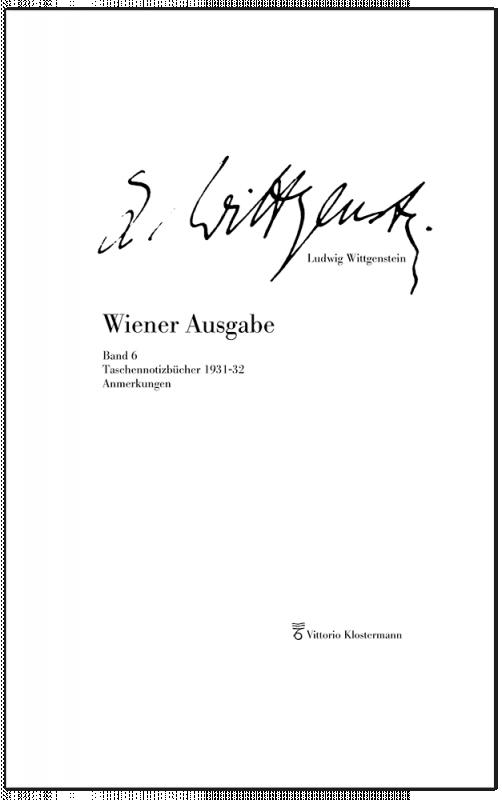
Band 6
der Reihe "Wittgenstein Wiener Ausgabe"
139,00
€
inkl. MwSt
- Verlag: Klostermann, Vittorio
- Themenbereich: Philosophie und Religion - Philosophie
- Genre: keine Angabe / keine Angabe
- Seitenzahl: 192
- Ersterscheinung: 25.01.2022
- ISBN: 9783465033370
Wiener Ausgabe
Band 6: Taschennotizbücher 1931-32. Anmerkungen
Michael Nedo (Herausgeber)
Im Vorwort zur Logisch-Philosophischen Abhandlung schreibt Wittgenstein: „Wenn diese Arbeit einen Wert hat, so besteht er in Zweierlei. Erstens darin, daß in ihr Gedanken ausgedrückt sind, und dieser Wert wird um so größer sein, je besser die Gedanken ausgedrückt sind. Je mehr der Nagel auf den Kopf getroffen ist.“ Diese Präzisierung wird besonders sichtbar in Wittgensteins Taschennotizbüchern, wo seine Bemerkungen oft in mehreren Versionen existieren, zumeist in sprunghafter Abfolge, in einer Art status nascendi. Die den Manuskriptbänden VI bis IX (WA3 bis WA5) voraufgehenden Notizbücher MSS 153a, 153b, 154 und 155 aus der Zeit von 1931 bis 1932 sind erhalten und werden mit diesem Band erstmals veröffentlicht. Bei der Übernahme in die Manuskriptbände ändert Wittgenstein die Abfolge der Bemerkungen, mit dem Zweck, wie er im Vorwort zu den Philosophischen Untersuchungen schreibt, „daß darin die Gedanken von einem Gegenstand zum andern in einer natürlichen und lückenlosen Folge fortschreiten sollten“. Und damit einher gehen oftmals weitere Präzisierungen, nicht zuletzt auch in einem poetischen Sinn, denn, wie Wittgenstein schreibt: „Den richtigen Stil schreiben heißt, den Wagen genau aufs Geleise setzen.“ [2. März 1940]
In the preface to the "Tractatus", Wittgenstein writes: "If this work has a value, it consists in two things. First, in the fact that thoughts are expressed in it, and this value will be the greater, the better the thoughts are expressed. The more the nail is hit on the head." This specification is particularly visible in Wittgenstein's pocket notebooks, where his remarks often exist in multiple versions, mostly in erratic succession, in a kind of status nascendi. The notebooks preceding the manuscript volumes VI to IX (WA3 to WA5), MSS 153a, 153b, 154, and 155, dating from 1931 to 1932, have been preserved and are published for the first time in this volume. In transferring them to the manuscript volumes, Wittgenstein changes the sequence of the remarks, with the purpose, as he writes in the preface to the "Philosophical Investigations", "that in them the thoughts should progress from one object to another in a natural and unbroken sequence." And this is often accompanied by further specification, not least in a poetic sense, for, as Wittgenstein writes: "To write the right style is to set the wagon exactly on the track." [March 2, 1940]
In the preface to the "Tractatus", Wittgenstein writes: "If this work has a value, it consists in two things. First, in the fact that thoughts are expressed in it, and this value will be the greater, the better the thoughts are expressed. The more the nail is hit on the head." This specification is particularly visible in Wittgenstein's pocket notebooks, where his remarks often exist in multiple versions, mostly in erratic succession, in a kind of status nascendi. The notebooks preceding the manuscript volumes VI to IX (WA3 to WA5), MSS 153a, 153b, 154, and 155, dating from 1931 to 1932, have been preserved and are published for the first time in this volume. In transferring them to the manuscript volumes, Wittgenstein changes the sequence of the remarks, with the purpose, as he writes in the preface to the "Philosophical Investigations", "that in them the thoughts should progress from one object to another in a natural and unbroken sequence." And this is often accompanied by further specification, not least in a poetic sense, for, as Wittgenstein writes: "To write the right style is to set the wagon exactly on the track." [March 2, 1940]
Meinungen aus der Lesejury
Es sind noch keine Einträge vorhanden.

